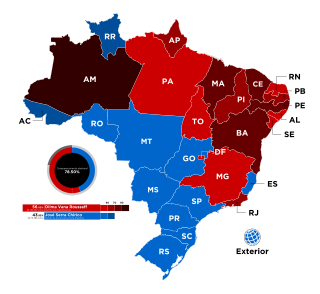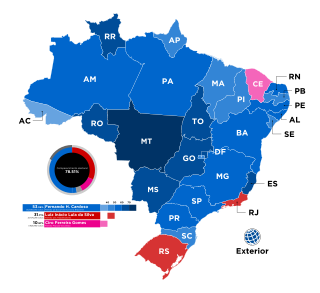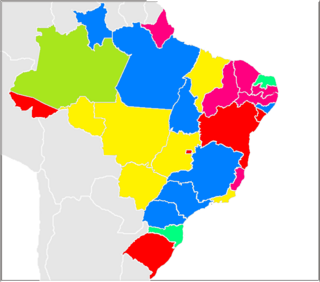Related Research Articles

The politics of Bolivia takes place in a tree of a presidential representative democratic republic, whereby the president is head of state, head of government and head of a diverse multi-party system. Executive power is exercised by the government. Legislative power is vested in both the government and the two chambers of parliament. Both the Judiciary and the electoral branch are independent of the executive and the legislature. After the 2015 election, 53.3% of the seats in national parliament were held by women, a higher proportion of women than that of the population.

The Workers' Party is a centre-left to left-wing political party in Brazil that is currently the country's ruling party. Some scholars classify its ideology in the 21st century as social democracy, with the party shifting from a broadly socialist ideology in the 1990s. Founded in 1980, PT governed at the federal level in a coalition government with several other parties from 1 January 2003 to 31 August 2016. After the 2002 parliamentary election, PT became the largest party in the Chamber of Deputies and the largest in the Federal Senate for the first time. With the highest approval rating in the history of the country, President Luiz Inácio Lula da Silva is PT's most prominent member. Dilma Rousseff, also a member of PT, was elected twice but did not finish her second term due to her impeachment in 2016. The party came back to power with Lula's victory in the 2022 presidential election.

The Democratic Socialist Perspective (DSP) was an Australian Marxist political group, which operated as the largest component of a broad-left socialist formation, the Socialist Alliance. In 2010, the DSP voted to merge into the Socialist Alliance.

Open list describes any variant of party-list proportional representation where voters have at least some influence on the order in which a party's candidates are elected. This is as opposed to closed list, which allows only active members, party officials, or consultants to determine the order of its candidates and gives the general voter no influence at all on the position of the candidates placed on the party list.

Elections in Venezuela are held at a national level for the President of Venezuela as head of state and head of government, and for a unicameral legislature. The President of Venezuela is elected for a six-year term by direct election plurality voting, and is eligible for re-election. The National Assembly (Asamblea Nacional) has 165 members (diputados), elected for five-year terms using a mixed member majoritarian system. Elections also take place at state level and local level.

The Democratic Labour Party is a political party in Brazil.

People's Party of Panama was a communist party in Panama. It was founded on 4 April 1930 as the Communist Party of Panama, after Panamanian communists broke away from the Labour Party. Early leaders of the PCP included Eliseo Echévez and Cristóbal Segundo. The PCP joined the Communist International and reached its apogee of popularity during and right after World War II. In 1943 the PCP changed its name to the People's Party of Panama.

Brazil elects on the national level a head of state—the president—and a legislature. The president is elected to a four-year term by absolute majority vote through a two-round system. The National Congress has two chambers. The Chamber of Deputies has 513 members, elected to a four-year term by proportional representation. The Federal Senate has 81 members, elected to an eight-year term, with elections every four years for alternatively one-third and two-thirds of the seats. Brazil has a multi-party system, with such numerous parties that often no one party has a chance of gaining power alone, and so they must work with each other to form coalition governments.

Cidadania is a Brazilian political party. It was originally founded as the Popular Socialist Party by members of the former Brazilian Communist Party (PCB), as a centre-left social democratic and democratic socialist party. Despite its left-wing alignment, PPS moved to be opposition against the Workers' Party since 2004, forming alliances with centre-right parties, in particular the Brazilian Social Democracy Party (PSDB), and supporting the Impeachment of Dilma Rousseff. Later the party's National Convention adopted the new naming in March 2019, and it was later approved by the Superior Electoral Court that September. The party then began moving towards a more social liberal position akin to the third way.

The Brazilian Socialist Party is a political party in Brazil. It was founded in 1947, before being abolished by the military regime in 1965 and re-organised in 1989 after the re-democratisation of Brazil. It elected six Governors in 2010, becoming the second largest party in number of state governments, behind only PSDB. In addition to that, it won 34 seats in the Chamber of Deputies and three seats in the Senate, besides having been a member of the For Brazil to Keep on Changing coalition, which elected Dilma Rousseff as President of Brazil.

General elections were held in Brazil on 3 October 2010 to elect the president, National Congress and state governors. As no presidential candidate received more than 50% in the first round of voting, a second round was held on 31 October to choose a successor to Luiz Inácio Lula da Silva of the Workers' Party (PT), who was constitutionally ineligible to run for a third term as he has already served two terms after winning the elections in 2002 and being re-elected in 2006.

General elections were held in Brazil on 4 October 1998 to elect the President, National Congress and state governorships. If no candidate in the presidential election received more than 50% of the vote in the first round, a second-round runoff would have been held on 25 October. The election saw voting machines used for the first time in Brazilian history.

The 2010 Brazilian gubernatorial elections were held on Sunday, October 3, as part of the country's general election. In these elections, all 26 Brazilian states and the Federal District governorships were up for election. When none of the candidates received more than a half of the valid votes in a given state, a run-off was held on October 24, 2010 between the two candidates with the most votes. According to the Federal Constitution, Governors are elected directly to a four-year term, with a limit of two terms. Eleven governors were prohibited from seeking re-election.
Labor and Agrarian Party was a Panamanian right-of-center political party, founded in 1960.
The Popular Nationalist Party was a Panamanian centrist political party.

The state elections in Rio Grande do Sul in 2010 were held at the same time as Brazil's federal elections October 3. Since 1994, as a result of a constitutional amendment that reduced the presidential term to four years, all federal and state elections in Brazil are held on the same date. The state elections decide governors and the membership of the State Legislative Assemblies. Additionally, members of Congress are elected by the people of each state.

The Free Fatherland Party was a left-wing political party in Brazil. Founded on April 21, 2009 by members of the Revolutionary Movement 8th October (MR-8), it advocates for scientific socialism. Its symbols were a green and yellow flag with a five-pointed red star and the inscription "Pátria Livre". PPL's identification number, as determined by the Supreme Electoral Court, was 54.

General elections were held in Costa Rica on Sunday, 2 February 2014 to elect a new president, two vice presidents, and 57 Legislative Assembly lawmakers. In accordance with Article 132 of the constitution, incumbent President Laura Chinchilla Miranda was ineligible to run for a second consecutive term.

Tabata Claudia Amaral de Pontes is a Brazilian politician and education activist. She is currently a federal deputy for the Brazilian Socialist Party (PSB) representing the state of São Paulo. Throughout 2019, she was a vice-leader of the PDT and its associated political coalition.
References
- ↑ Electoral Tribunal Archived 2010-01-19 at the Wayback Machine
- ↑ Electoral Tribunal Archived 2010-01-19 at the Wayback Machine